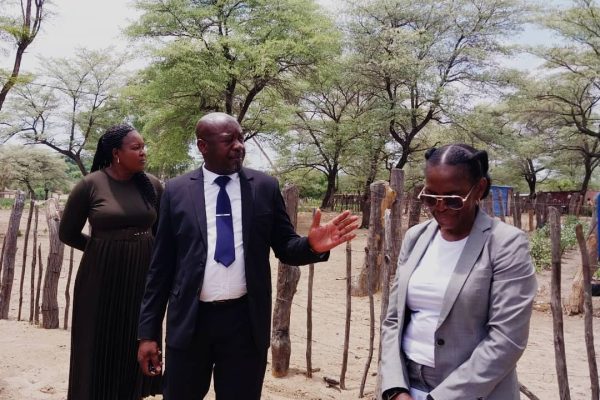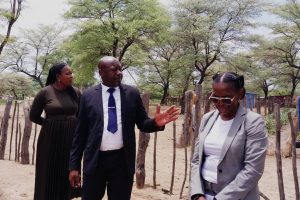
By: Loise Shiimi
Lingani Sibalatani, a potato grower from the Hardap Region, has recognised the high demand for potatoes and aims to capitalise on it.
Having conducted research and completed multiple farming courses, she planted 8,000 seedlings in August and expects to harvest 25 tons of potatoes this December or in January 2026.
In an interview with The Villager, Sibalatani shared her journey, mentioning that while becoming a potato farmer was not her childhood dream, she saw great potential in potato cultivation in Namibia and pursued it.
“Potatoes are a staple food for many households, leading to high demand. Millions of people consume potatoes monthly, underscoring their status as a staple food,” she explained.
Regarding the progress of her crops, Sibalatani noted that her potatoes are thriving due to her adherence to proper farming practices. She highlighted that the climate in Hardap is more conducive for potato production compared to other regions.
When asked about the manageability of potato farming, Sibalatani expressed that growing potatoes is feasible as long as proper farming techniques are followed. This includes testing the soil to ensure its suitability, careful planting, and thorough land preparation.
Despite the manageability of the crop, she mentioned several challenges which could hinder progress, urging farmers to adhere to the appropriate planting seasons.
“The ideal planting months for potatoes are August and September for a December or January harvest. In areas without frost or extreme heat, planting from February to April is best, yielding harvests from June to September,” she advised, adding that planting during winter frost can adversely affect the crops.
She noted that potatoes require well-drained, loamy and sandy soil, and that controlling unwanted weeds is essential, also sharing that high humidity can lead to fungal diseases. In terms of marketing, Sibalatani plans to supply her potatoes to households through retail channels and directly to consumers, restaurants, hotels, and catering services.
Sibalatani spoke to the importance of building strong partnerships to create an open market and reduce reliance on imports. She also intends on adding value to her potato production by avoiding the sale of raw potatoes alone.
“I am currently researching the dehydration of potatoes for long-term storage, as well as producing potato flour that can be used in baking and cooking,” she stated.
To aspiring potato farmers, Sibalatani encourages staying informed about best farming practices, seeking mentorship from experienced farmers or organisations for guidance, and nurturing relationships with buyers and other stakeholders.
For now, Sibalatani is considering the Noya and Solhy012 potato varieties. With the 8,000 seedlings planted, she plans to expand her production area to 10 hectares over the next 2 to 3 years.
“I aim to introduce my own variety suited to local conditions to diversify my product offerings. I intend to improve yield and quality while continuing soil testing to identify nutrient deficiencies and determine the appropriate fertilisers, which can only be achieved through soil analysis,” she explained.
She also noted that her seedlings are sourced from South Africa, a challenge for many local farmers. Consequently, she is working towards developing her own seedlings for nationwide distribution. Meanwhile, during President Nandi-Ndaitwah’s visit to the University of Namibia in September, Vice Chancellor Kenneth Kamwi Matengu revealed that the university is collaborating with the Namibia Agronomic Board (NAB) to develop the country’s seed sector to reduce seed imports.
“As UNAM, we have the mandate to educate and conduct relevant research that meets people’s needs. Our collaboration with the Namibia Agronomic Board aims to establish a certified seed sector in Namibia. The project targets four crops: white maize, pearl millet, wheat, and potatoes, and we have completed research to identify the best varieties for various climates,” he stated.
He further noted that the research has produced high-yielding, drought-resistant seeds requiring minimal water. Matengu confirmed that the suitable varieties for the different climates of the four targeted crops have been identified.
Concerning the completed research, Matengu stated that it is now time for seed multiplication. “Those who will plant these seeds will do so exclusively for seed production, not for consumption. The seed producers will then sell to farmers who will cultivate crops for food. We are extremely satisfied with the results for all four crops,” he mentioned.
Matengu reflected on the importance of quality seeds for food security, remarking, “If you have poor-quality or low-yield seeds, achieving significant harvests will be impossible.”
UNAM’s collaboration extends beyond NAB; for rice, the campus has worked extensively with Japanese and Indonesian partners, and with Chinese stakeholders for potatoes.









